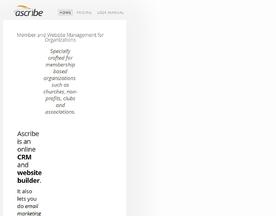Church Management Software is a software solution that is specifically designed to help churches automate their operations and data management. These tools help churches in organizing their financials, memberships, employees, donations, and other data. Church Management Software can be used by all types of churches, including small ones that have fewer than 100 members, medium-sized churches with up to 800 members as well as large churches.
The best church management software helps with managing the day-to-day operations of the church such as bookkeeping, membership management, communication, and fundraising capabilities. Some solutions also offer additional services such as managing volunteers, offering online donation portals and tracking attendance at services so that your church can better keep track of your finances, membership information and other critical data points related to running your church successfully.

Taking Advantage of the Cloud
Cloud based software is a popular option for many churches due to its accessibility, scalability, and security benefits. With cloud-based software, churches can access their administrative tools and data from anywhere with an internet connection, which can be particularly useful for remote work, mobile access, or multi-site churches. Cloud-based software can also scale up or down to meet the needs of growing or changing churches, without requiring additional hardware or infrastructure. Additionally, cloud-based software providers typically have robust security measures in place to protect data from unauthorized access or loss, providing peace of mind for church leaders and members.
11 Features to Look for in a Church Management System
All the features below should be considered essentual when it comes to choosing complete church management solutions. All cloud based solutions need to easily handle basic functions such as, event planning, donation management, volunteer scheduling, worship planning and overall ministry management. Lets take a deeper look into the core features to consider:
Member Management: This feature of church management software provides a centralized database to store information about members, including their contact information, family relationships, and membership history. This makes it easy to keep track of who is involved in the church and to manage communication with them. Some systems may also include fields for additional information, such as spiritual gifts or volunteer preferences, which can help with volunteer recruitment and management.
Contributions Management: This feature allows churches to manage church finances by track financial contributions from members, including tithes and offerings. It can also help manage online donations, pledges, set up recurring contributions, and generate reports on giving patterns and trends. This can help churches better understand their financial situation and make informed decisions about budgeting and spending.
Event Management: This feature helps churches manage events, including scheduling, registration, and communication with attendees. Churches can create events, manage registrations, and track attendance. Some systems may also include features for communicating with attendees, such as email reminders or text message notifications.
Communication: This feature allows your team to manage church communication with members through various channels, including email and SMS. Churches can send mass communications, such as newsletters, to all members or targeted groups. This can help improve communication and engagement with members, and keep them informed about events, activities, and news.
Volunteer Management: This feature helps churches manage volunteer information, schedule volunteers, and track volunteer hours. Churches can store information about volunteers, such as their availability and areas of expertise, which can help with volunteer recruitment and management.
Small Group Management: This feature allows churches to manage information about small groups, including schedules, meeting locations, and leader information. Churches can communicate with small group members and keep track of attendance.
Attendance Tracking: This feature allows churches to track attendance for events and services. Churches can generate reports on attendance patterns and trends, which can help with planning and decision-making.
Child Check-In: This feature helps churches manage the check-in process for children, including tracking attendance and generating reports. Churches can ensure the safety of children, and manage their participation in events and activities.
Financial Management: This feature allows churches to track budget information, generate financial reports, and manage accounts payable and receivable. Churches can keep track of income and expenses, and make informed decisions about budgeting and spending.
Reporting: This feature provides the ability to generate reports, including attendance, contributions, and event reports. Churches can use these reports to gain insights into their operations and make informed decisions.
Integration with Other Tools: This feature allows church management software to integrate with other tools, such as calendars, payment processing systems, and social media platforms. Integrating with other tools can help churches streamline their processes and improve efficiency.

Best Church Management Software
Choosing the right church management software solution can be a complex and time-consuming process. It is important to first identify your specific needs and budget for the software. Once you have a clear understanding of what you are looking for, you can research and compare different options. It is recommended to get feedback from church members to ensure that the software will meet their needs as well. When choosing a vendor, look for one with a proven track record of providing high-quality software and customer support.
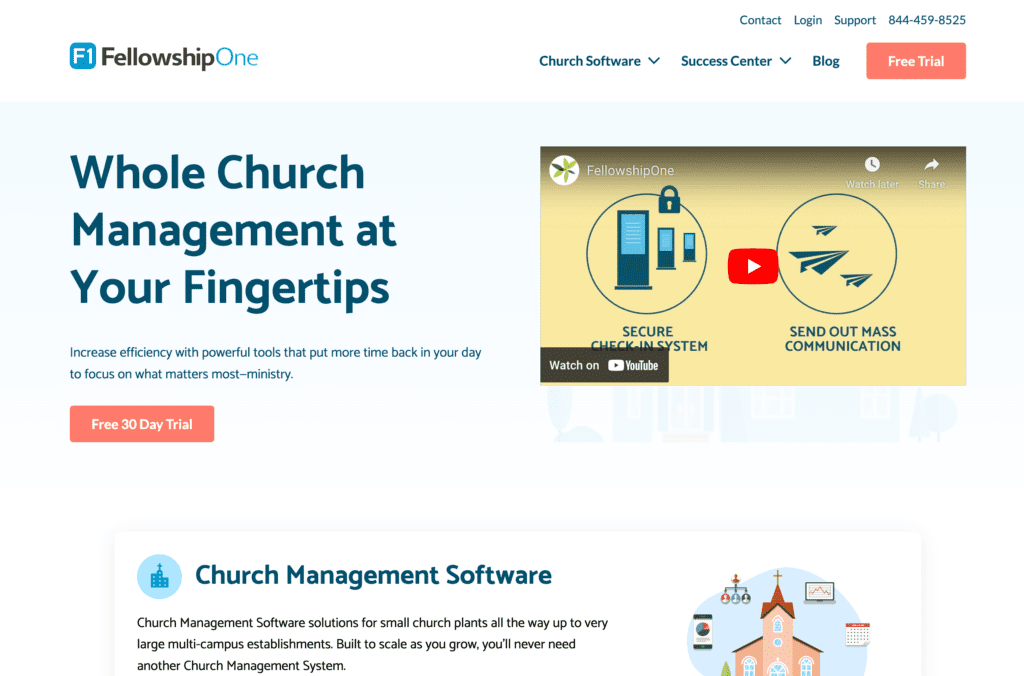
FellowshipOne
FellowshipOne is a comprehensive church management software that offers a range of features, including mobile apps, member management, contributions management, and event management.
Pros of FellowshipOne:
User-friendly interface: FellowshipOne has a user-friendly interface that makes it easy to manage church operations, including member management, contributions tracking, and event scheduling.
Robust reporting: FellowshipOne provides robust reporting capabilities, which allows churches to get insights into their operations and make informed decisions.
Customizable: FellowshipOne is highly customizable, allowing churches to configure the software to meet their specific needs.
Integration with other tools: FellowshipOne integrates with other tools, such as accounting software, to provide a seamless and integrated experience.
Cons of FellowshipOne:
Steep learning curve: While FellowshipOne is user-friendly, it can have a steep learning curve for some users, particularly those who are not familiar with church management software.
Cost: FellowshipOne can be more expensive compared to other church management software options, which may be a barrier for some smaller churches.
Limited integrations: While FellowshipOne integrates with other tools, the number of integrations may be limited compared to other church management software solutions.
Technical issues: Some users have reported technical issues with FellowshipOne, such as slow performance or system crashes, which can impact productivity and efficiency.
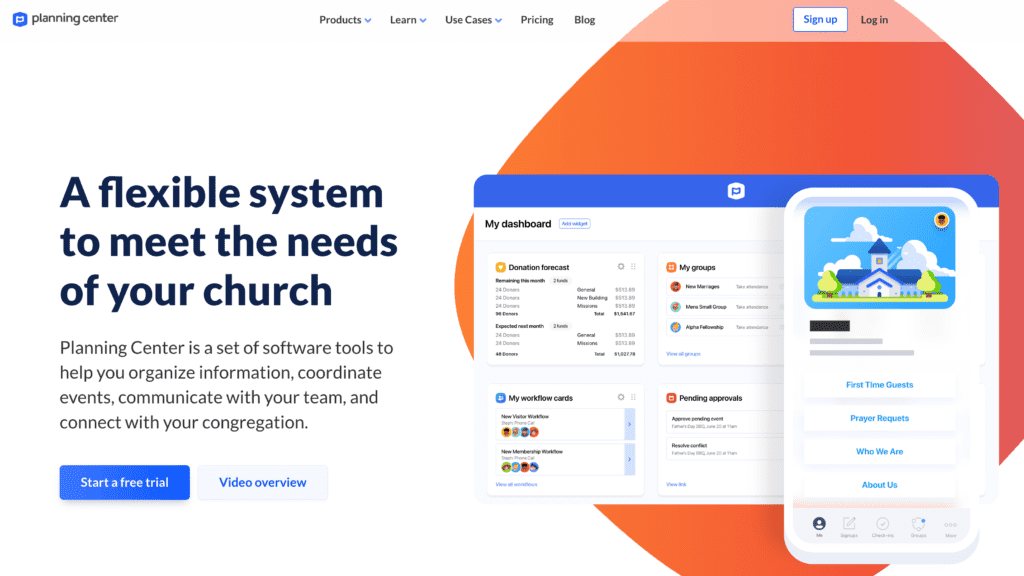
Planning Center
Planning Center is cloud-based church management software that is focused on providing scheduling and communication tools to church organizations.
Pros of Planning Center:
Focus on planning and scheduling: Planning Center is specifically designed to help churches plan and schedule events and services, making it ideal for churches that place a high importance on these tasks.
User-friendly interface: Planning Center has a user-friendly interface that makes it easy to manage church operations, including event scheduling and resource management.
Integration with other tools: Planning Center integrates with other tools, such as accounting software, to provide a seamless and integrated experience.
Mobile accessibility: Planning Center provides a mobile app, which allows users to access the non profit organizations software from anywhere, making it ideal for events management and helping busy church teams who are on-the-go.
Cons of Planning Center:
Limited features: While Planning Center excels at planning and scheduling, it may lack some of the features of other church management software solutions, such as member management or contribution tracking.
Steep learning curve: Some users have reported that Planning Center has a steep learning curve, particularly for those who are not familiar with church management software.
Cost: Planning Center can be more expensive compared to other church management software options, which may be a barrier for some smaller churches.
Technical issues: Some users have reported technical issues with Planning Center, such as slow performance or system crashes, which can impact productivity and efficiency.
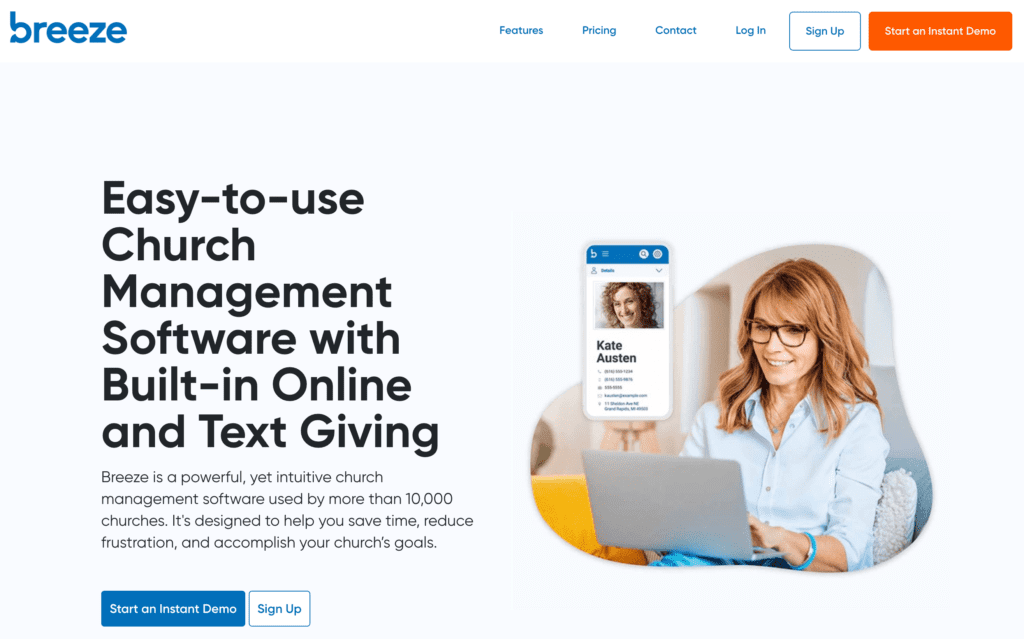
Breeze
Breeze is a web-based church administration software that offers a range of features, including member management, contributions management, and event management.
Pros of Breeze:
User-friendly interface: Breeze has a user-friendly interface that makes it easy to manage church operations, including member management, contributions tracking, and event scheduling.
Affordable pricing: Breeze is generally more affordable compared to other church management software options, making it a good choice for smaller churches or those on a budget.
Integration with other tools: Breeze integrates with other tools, such as accounting software, to provide a seamless and integrated experience.
Mobile accessibility: Breeze provides a mobile app, which allows users to access the software from anywhere, making it ideal for busy church staff who are on-the-go.
Cons of Breeze:
Limited reporting capabilities: While Breeze provides some reporting capabilities, it may not be as robust as other church management software solutions.
Limited customization options: Breeze may not provide as many customization options as other church management software solutions, which can limit its flexibility.
Technical issues: Some users have reported technical issues with Breeze, such as slow performance or system crashes, which can impact productivity and efficiency.
Limited integrations: While Breeze integrates with other tools, the number of integrations may be limited compared to other church management software solutions.
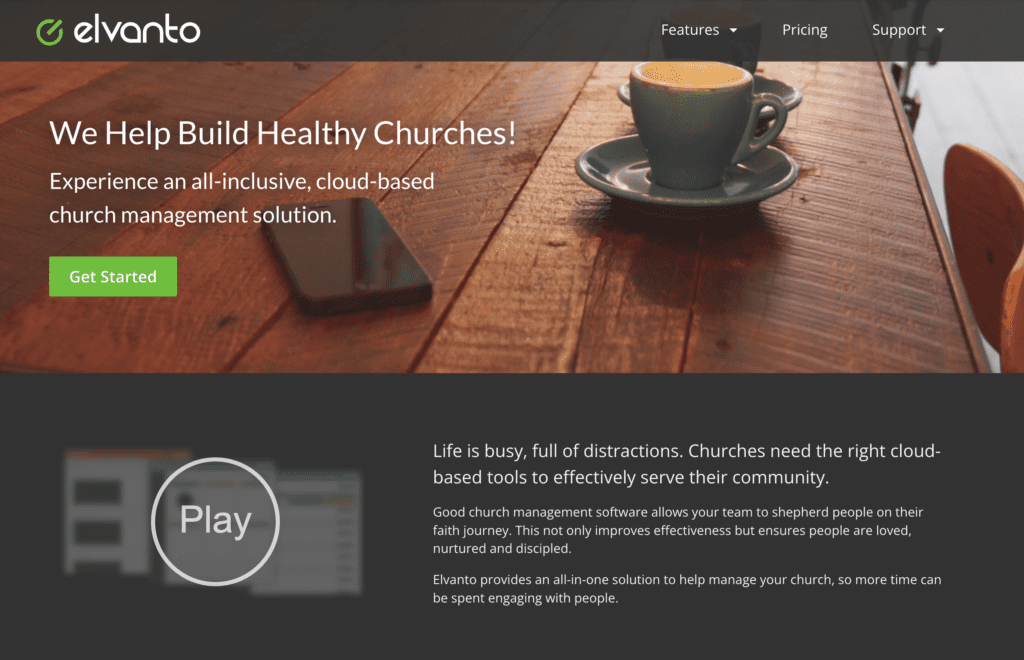
Elvanto
Elvanto Church Software is a cloud-based church management solution that offers a range of features and tools for managing religious organizations.
Pros of Elvant Church Software:
Comprehensive feature set: Elvant Church Software provides a comprehensive feature set, including member management, contributions tracking, event scheduling, and more.
Integration with other tools: Elvant Church Software integrates with other tools, such as accounting software, to provide a seamless and integrated experience.
Customizable: Elvant Church Software is highly customizable, allowing churches to configure the software to meet their specific needs.
User-friendly interface: Elvant Church Software has a user-friendly interface that makes it easy to manage operations and church events.
Cons of Elvant Church Software:
Cost: Elvant Church Software may be more expensive compared to other church management software options, which may be a barrier for some smaller churches.
Steep learning curve: Some users have reported that Elvant Church Software has a steep learning curve, particularly for those who are not familiar with church management software.
Limited mobile accessibility: Elvant Church Software may not have a mobile app or mobile-optimized website, which can limit accessibility for busy church staff who are on-the-go.

How to Choose the Best Church Management Software for Your Church
Identifying Your Needs:
The first step in choosing the best church management system for your church is to identify your specific needs. Consider what features are most important to your church, such as member management, contributions tracking, or event scheduling. Make list of these requirements and prioritize them to help guide your search for a solution. Its worth remembering that more flexible church management software is always better!
Budgeting:
Once you have a clear understanding of your needs, it’s important to consider your budget. Church management software can range from free solutions to more expensive enterprise-level options, so it’s important to choose a solution that fits within your budget.
Getting Feedback from Your Church Members:
Involving your church leaders in the decision-making process can be helpful in choosing the best church management software. You can ask for feedback on what features they need and what they would like to see in a solution. This can help ensure that you choose a solution that meets the needs of your church as a whole.
Choosing the Right Vendor:
When choosing the right church management tools it’s important to consider their reputation, customer support, and integrations with other tools that you may use. Consider reaching out to other churches or organizations in your network to ask for recommendations and feedback on different vendors.
Implementing the Software:
Once you have chosen a solution, it’s important to implement it effectively. This may involve training for staff and volunteers, data migration from any previous systems, and communication with members about the changes. A successful implementation requires planning and communication, so it’s important to allocate the necessary resources to make the transition as smooth as possible.

Church Management Software – FAQ
What is church management software?
Church management software is a specialized tool designed to help churches and other religious organizations manage their administrative tasks, such as member information, donations, events, communication, and more.
Why do churches need church management software?
Church management software can help churches save time and resources by streamlining their administrative tasks, improving communication with members and visitors, and enhancing engagement and retention.
What features should I look for in church management software?
A: Some key features to consider when choosing church management software include membership management, contribution tracking, event management, communication tools, online giving options, mobile accessibility, security and privacy features, and integration with other tools or platforms.
How much does church management software cost?
The cost of church management software can vary depending on the features, the size of the church or organization, and the pricing model (e.g. subscription, one-time purchase). Some software options offer free or low-cost plans for smaller churches or those with limited budgets.
How can I evaluate and compare different church management software options?
To evaluate and compare different church management software options, you can start by making a list of your must-have features and priorities, then research and compare different software options based on those criteria. You can also read reviews and ratings from other churches and users, and request demos or trials to test the software firsthand.
Can church management software help with online church services?
Yes, many church management software options include features that can help with online church services, such as live streaming, video conferencing, virtual event management, and online giving tools.
Is it necessary to have technical expertise to use church management software?
While some church management software options may require technical expertise or IT support to set up and use, many options are designed to be user-friendly and accessible to non-technical users. Some software providers also offer training, support, and resources to help churches get started and make the most of their software.
Can church management software help with outreach and evangelism?
Yes, some church management software options include features that can help with outreach and evangelism, such as social media integration, email marketing tools, visitor tracking, and outreach automation. These tools can help churches reach new audiences, nurture relationships with current members, and promote their message and mission.
Free Church Management Software?
Looking for some affordable church management software that won’t break the bank? There are several free church management software options available, with basic features that can help small or start-up churches manage their administrative tasks. ChurchTrac is a free church management software that offers basic features such as member tracking, contribution management, and attendance tracking. The free plan is limited to 100 members, but upgrades are available for larger churches or additional features.

Conclusion
In this article, we have discussed the features to look for in church management software, reviewed the top church management software options, and provided a step-by-step guide on how to choose the best church management software for your church. It is important to identify your specific needs, consider your budget, gather feedback from members, choose the right vendor, and implement the software effectively.
Church management software can be a valuable tool for streamlining operations, increasing efficiency, and improving communication within a church. By following the steps outlined in this article, your church can choose a solution that meets its specific needs and helps it achieve its goals. With the right church management software, your church can focus on its mission and serve its members more effectively.








